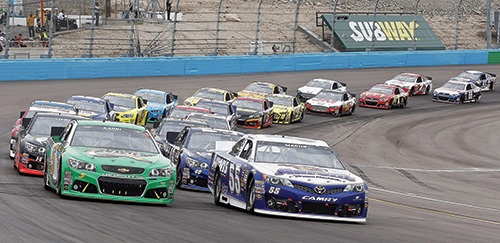There has been a lot of discussion about the future of the NFL as our understanding of concussions and their long-term effects has improved. There has been serious talk that the game might not even exist in 30 years. But I have never once heard anyone talk about the long-term viability of NASCAR, one of the most wasteful, unsafe and environmentally irresponsible pastimes in the world.
Footprints at the track

damage over the course of its season. Photo by ©AP photo/Ross D. Franklin
There has been a lot of discussion about the future of the NFL as our understanding of concussions and their long-term effects has improved. There has been serious talk that the game might not even exist in 30 years. But I have never once heard anyone talk about the long-term viability of NASCAR, one of the most wasteful, unsafe and environmentally irresponsible pastimes in the world.
There may be NASCAR fans reading, so before you jump down my throat, some background: I grew up in Indianapolis, so I have always held a strange reverence for auto racing. The Indy 500 put my hometown on the map; it’s the most famous auto race in the world, the greatest spectacle in racing. In 1994, NASCAR came to Indy. I went to the first Brickyard 400, and I was shocked by how exciting it was. Racing is a part of my childhood. I’m no fan—I don’t pay attention and don’t understand why anyone would, but it’s a benign neglect. Until now.
The 2013 Sprint Cup Series kicked off just three weeks ago in Daytona, and for whatever reason, I am more aware of NASCAR than I have ever been. The sport is shrewd in its scheduling, beginning during the NFL’s only real lull and coinciding with the doldrums of the NBA season’s second half, and now they have Danica Patrick, so maybe this is NASCAR’s moment in the sun.
But here are some numbers, courtesy of the fine people at HowStuffWorks.com. Your typical stock car averages five miles to the gallon. That means that, in a 40-car race, a conservative estimate of the sport’s weekly gasoline consumption is 6,000 gallons. Each gallon of fuel burned yields about 20 pounds of carbon dioxide (carbon footprint is measured in pounds), which means that over the course of a 35-race season, NASCAR’s carbon footprint is in the neighborhood of 4 million pounds. When you take into account practices and qualifying, this number is probably low.
It’s an odd statistic to put into perspective, because it’s not something that would even cross our minds relative to other sports. Of course fueling giant stadiums has an environmental effect, but NASCAR’s negligence is so much more direct and tangible. It also points to a larger societal problem: Cars, no matter how they are being used, are just plain dirty. As a nation, the U.S. burns about 400 million gallons of fuel every day, which translates to a footprint of 6 billion tons every year. Yikes.
Increasingly, public transportation is used as a measuring stick for a city’s viability. We are at least pretending to begin a conversation about high-speed commuter trains. It’s still not as prominent a topic as it needs to be, but at least we’re paying it some lip service. For whatever reason, NASCAR seems to be exempt from this discussion.
And these things are intrinsically related, because NASCAR is an incredibly popular sport. On a weekly basis, 75 million people tune in, second only to the NFL in terms of viewership. That’s nearly a quarter of all the people in the United States, and they are not engaging with the very real issue of environmental impact in racing, to say nothing of the even larger issue of driving in general. Imagine if we could get 75 million race fans personally invested in the issue of carbon emissions in driving. Perhaps none of them would care, but it would at least ratchet up the national discussion.
Unfortunately for race fans, I don’t really see two sides to this issue. There is very little in the nature of the sport that allows NASCAR to lessen its impact. Their few attempts to lighten their footprint have been superficial at best. In 2007, NASCAR finally stopped using leaded fuels (they were using fuel with lead in it until 2007!), transitioning to ethanol-blended fuels by 2011. The problem with these types of fuels is that, though their emissions per gallon are lower, they cause engines to run at higher horsepower, which lowers the fuel’s efficiency to a paltry two miles per gallon. Race cars burn more fuel over the same distances, offsetting the benefits of lower emissions.
It’s also important to remember that, however awful the burning of fossil fuels may be for our environment, our world still runs on them. We haven’t shown any real signs of change, which will probably cost us, but in the meantime, these fuels are our lifeblood, and they are finite. Auto racing not only contributes substantially to the problems of fuel-burning, it also wastes a nonrenewable resource. I’ve had some fun at the track, but the sport is kind of indefensible.
The NFL has its problems, too, and as the most popular sport in our country, those problems get a well-deserved bit of attention. But nipping at football’s heels is NASCAR, and its problems have far wider and direr implications for us all. And I don’t think we spend any time thinking about it at all. I can’t figure out why.





